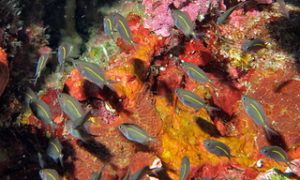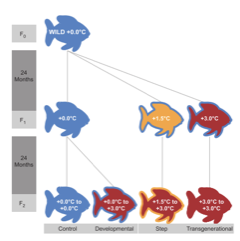Adaptation or Extinction: the Necessity of Fish Reproductive Acclimation in the Face of Climate Change
By Trish Albano, SRC intern
In an ever-changing marine environment, organisms must respond to their surroundings in order to remain reproductively successful. However, with the current rate of climate change predicted to raise sea surface temperatures by approximately 3°C by the year 2100 (Collins et al., 2013), species are faced with a choice: shift geographic range or gradually adapt to changes cross-generationally. In fishes, reproductive regulation and temperature are innately intertwined. Changes in environmental temperature have the ability to impact the hypothalamo-pituitary-gonadal (HPG) axis in the reproductive system of many species of fish. This gland controls the regulation of reproductive hormones necessary for reproductive success following a temperature cue. In a study at James Cook University in Australia, researchers aimed to evaluate if there was a difference in gene expression in adult spiny chromis damselfish (A. polyacanthus) (Image 1) that had different reproductive capabilities as a result of developmental and transgenerational exposure to increased temperature (Veilleux, Donelson, & Munday, 2018).

Image 1. Study species: spiny chromis damselfish (A. Polyanthus). Species of damselfish from the West Pacific (Source: Wikimedia Commons)
Overall, this study’s goal was to assess the potential for reproductive plasticity in the face of increased temperatures. In order to assess if damselfish had partially acclimated reproductive capability, the researchers evaluated gene expression in the fish using a step-wise transgenerational temperature treatment (Donelson et al., 2016) (Figure 1). It was hypothesized that the expression of reproductive genes would be down-regulated in damselfish who were exposed to the same high temperature levels as their parents. However, it was also hypothesized that the expression of genes in the step-wise temperature treatment (parents exposed to +1.5°C, offspring exposed to +3.0°C) would be similar to that of the control group (no temperature increase) due to partial acclimation of the reproductive system in response to elevated temperature.

Figure 1. Experimental design of the study showing the control group (no transgenerational temperature increase), developmental (+3.0 degrees C in offspring), step-wise (+1.5 degrees C in parent, + 3.0 degrees C in offspring) and transgenerational (+3.0 degrees C in parent and offspring). Duration of the experiment is shown in the gray bars on the left. (Source: Veilleux, Donelson, & Munday, 2018).
After completing the experiment, it was found that the step-wise treatment group had a comparable proportion of pairs that reproduced to the control group. On the other hand, pairs that were exposed to an immediate +3.0°C temperature increase (transgenerational and developmental) had fewer and no pairs reproducing successfully. The results of this experiment support the researcher’s hypothesis that partial reproductive acclimation to elevated temperatures would lead to more reproductive success. If climate change trends continue to result in increasing environmental temperature, maintaining reproductive success is key to marine species taking the adaptation approach versus changing geographic range.
Works cited
Collins M, Knutti R, Arblaster J, Dufresne JL, Fichefet T, Friedlingstein P, Gao X, Gutowski WJ, Johns T, Krinner G, et al. (2013) Long-term climate change: projections, commitments and irreversibility. In Stocker TF, Qin D, Plattner GK, Tignor M, Allen SK, Boschung J, et al, eds. Climate Change 2013: The Physical Science Basis. Contribution of Working Group I to the Fifth Assessment Report of the Intergovernmental Panel on Climate Change. Cambridge University Press, United Kingdom and New York.
Crozier
Donelson JM, Wong M, Booth DJ, Munday PL (2016) Transgenerational plasticity of reproduction depends on rate of warming across gen- erations. Evol Appl 9: 1072–1081.
Veilleux HD, Donelson JM, Munday PL (2018) Reproductive gene expression in a coral reef fish exposed to increasing temperature across generations. Conserv Physiol 6(1): cox077; doi:10.1093/conphys/cox077.




Leave a Reply
Want to join the discussion?Feel free to contribute!